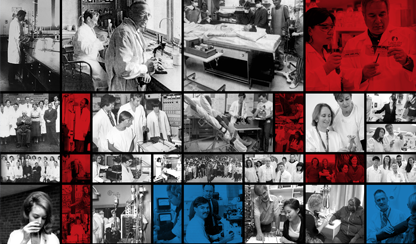13 January 2022
Institute news

Scientists from the Cambridge Baker Systems Genomics Initiative have used machine learning to create genetic predictors of blood cell traits, such as white blood cell counts, that are linked to chronic disease.
The research, published today in the journal Cell Genomics, identified shared genetic architecture between blood cell traits and various common diseases, including coronary artery disease.
Senior author Professor Michael Inouye, Munz Chair of Cardiovascular Prediction and Prevention at the Baker Institute, said the findings could pave the way for novel, personalised methods to better predict, prevent and treat a variety of conditions, including heart disease, the world’s biggest killer.
Blood cells play essential roles in a variety of biological processes that keep our body working well.
Blood cell traits — such as the number of cells and the proportions of different types — are among the most common tests in healthcare. These traits are partially inherited, and their genetic architecture is polygenic, which means they are influenced by a combination of many genetic variants.
Professor Inouye’s team wanted to find the best way to predict an individual’s blood cell traits by compiling the predictive information from across the human genome, known as a polygenic score.
But designing polygenic scores is still a relatively new process. It remains challenging, with more than 324 million known variants on the human genome, and the optimal methods are unclear.
To address this, Professor Inouye’s team looked at six different machine and deep learning methods, using data from large research biobanks like the UK Biobank and INTERVAL. They then used the best method to achieve optimal predictive power for 25 different blood cell traits.
“Blood cell measurements are used worldwide to guide clinical decision making. However, everyone's blood cells are different and those differences are partially inherited. We don't currently incorporate those genetic differences in healthcare, but these machine-learning optimised polygenic scores should help to facilitate that,” Professor Inouye said.
By linking the powerful new polygenic scores with those already developed to calculate inherited risk of chronic diseases, the study confirmed well-known connections between certain blood cell traits and conditions like asthma, rheumatoid arthritis, schizophrenia, and Crohn’s disease.
But the team also identified new associations between blood cell traits and coronary artery disease.
“By comparing their shared genetics, we're able to identify which blood cell traits may be either indicators or mediators of coronary artery disease risk,” Professor Inouye said.
“We further show that the effects of the polygenic scores change depending on if you're a man or woman, which can also result in very different trajectories of blood cell traits as you age.
“Taken together, this research is a major step toward personalising how we could use the information in one of the most common medical tests in the world. It may be used to both predict individual trajectories of blood cell traits as someone ages, as well as what this may mean for their risk of many different diseases, including heart disease.”
The optimised scores are now publicly available on the PGS Catalog, to enable further translational studies and development.





